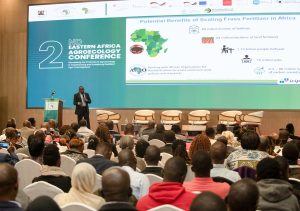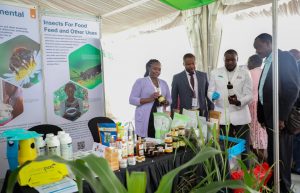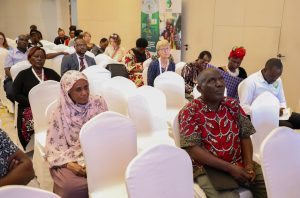27 March 2025
Uncategorized
The 2nd Eastern Africa Agroecology Conference, held in Nairobi, Kenya, featured a keynote speech by Dr Chrysantus Mbi Tanga, Senior Scientist and Head of the Insects for Food, Feed and Other Uses (INSEFF) Programme at the International Centre of Insect Physiology and Ecology (icipe). Dr Tanga’s presentation highlighted insect frass fertilizer innovations for better soil health and agri-food systems transformation in Africa.
His address underscored several critical themes including:
- Soil degradation challenges in agroecosystems: He emphasized the pressing need to address soil degradation, which threatens the sustainability of agroecosystems across Africa.
- Rising pest and disease pressure threatening agriculture: He noted the significant rise in crop pests and diseases threatening agriculture, which necessitates innovative solutions to protect agricultural productivity.
- Insect-based organic fertilizer: Dr Tanga discussed the potential of insect-based organic fertilizers as a sustainable alternative to conventional organic fertilizers.
- Insect-based biorationals in agroecology: He also explored the role of insect-based biorationals, which are derived from insect chitin, in enhancing agroecological practices and ensuring safe food production.
A key point of his speech was that insect frass fertilizer is superior in nutrients compared to traditional organic fertilizers and offers additional benefits of acidity reduction and suppression of pests and diseases. Dr Tanga highlighted the benefits of scaling up frass fertilizer production in Africa, citing its potential to improve soil health, boost crop productivity, enhance food security, create jobs, increase climate resilience and recycle huge volumes of agro-industrial waste.

Dr Tanga concluded by emphasizing the importance of cutting-edge research, innovation, capacity building, partnerships, and support from development partners in achieving these goals. He noted that scaling up frass fertilizer production requires access to capital and technology integration. Furthermore, achieving higher adoption rates, quality control, and commercialization depends on establishing standards and enabling policies.
The conference, themed “Strengthening agri-food system transformation for resilience, sustainability, and socio-economic development”, aimed to leverage agroecology to transform and sustain resilient agri-food systems. Organized by Biovision Africa Trust, the Ministry of Agriculture and Livestock Development, and over twenty partners, the event aligns with the African Union’s Ecological Organic Agriculture (EOA) initiative. The EOA initiative promotes sustainable organic farming systems to improve food security, agricultural productivity, and livelihoods across Africa while safeguarding the environment.

icipe‘s participation at the conference
icipe was actively involved in the conference, with its Technology Transfer Unit (TTU) exhibiting innovative technologies and solutions. The TTU plays a crucial role in strengthening cross-linkages between researchers, farmers, donors, enterprises, and policymakers, facilitating better processes for technology transfer and adoption.

In addition to Dr Tanga, other notable icipe scientists who attended the conference included Dr Samira Mohammed, Head of the Agriculture & Climate Change Thematic Research Programme, Dr Frank Chidawanyika, Senior Scientist and Coordinator of the Regional Multi-actor Research Network (RMRN) for Agroecology in East Africa and Dr Takemore Chagomoka, Head of Technology Transfer Unit. Their participation underscored icipe‘s commitment to advancing agroecological practices and transforming agri-food systems in Africa.
